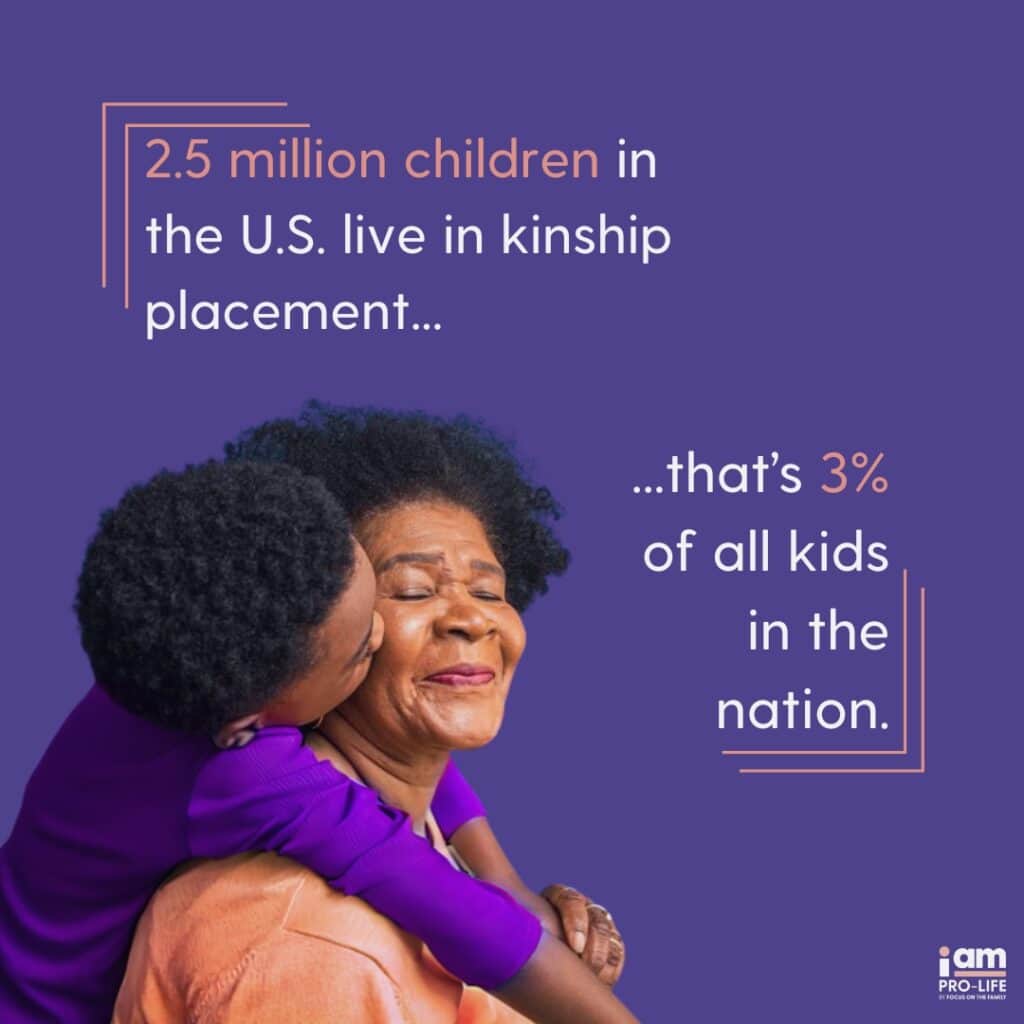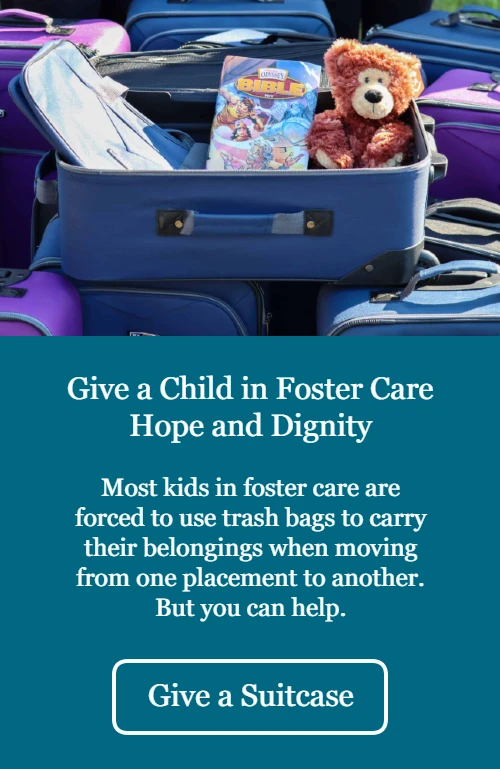You may have wondered before, “What is kinship placement?” If you are caring for a relative’s children, you may not have heard the term “kinship placement” before you welcomed them into your home. An estimated 2.5 million children in the U.S. today live in a kinship placement. That number works out to 3% of all kids in the nation.
What is Kinship Placement?
A fast-growing area of foster care policy, “kinship care,” occurs when extended family members step up to care for children at risk of entering the system. Often used synonymously with “kinship care,” Kinship placement occurs when relatives open their homes to care for children. Grandparents often step into this role, but a kinship placement can be with an aunt, uncle, cousin, adult sibling, or anyone related to the child(ren). Placement can occur for a few weeks, months, or as long as needed—sometimes permanently, through legal guardianship or adoption.
What Leads to Kinship Placement?
Put simply, children need kinship care or a kinship placement when their parents are unable to take care of them. Depending on state law, kinship placement can be either informal or formal, with many relatives recognizing a need in their family and making an arrangement with the children’s parents. In an informal kinship placement, the biological parents retain custody of their child, and the child is technically not in foster care. Because informal kinship caregivers may struggle to get children medical care or enroll them in school, some receive temporary guardianship, or temporary legal authority, which must be granted by the biological parent.

In other circumstances, the children’s needs may come to the attention of the county or state social services agency. A social worker determines the children are unsafe in their parents’ care and seeks kinship care for them. A child welfare worker may recommend that parents voluntarily place their child with relatives to avoid going to court. This is called voluntary kinship care and varies greatly between states and by case. Your state may impose the same supervision requirements in a kinship care placement as regular foster placements, including approving vacations or even prohibiting overnight stays with friends.
Sometimes kinship caregivers agree to care for children temporarily but later realize longer-term care is needed, which requires a court order. The process can be cumbersome, such as scheduling a court hearing and giving notice to biological parents. Some states may have laws requiring the court to appoint a guardian ad litem to review the proposed arrangement on behalf of the child. Most courts try to make the process clear enough that when parents and guardians are in agreement, you will not need an attorney.
Additional Resources:
Kinship Placement Considerations
If you or someone you know is considering taking on a kinship placement, it’s important to have realistic expectations. There are four main area to consider regarding kinship placement, including finances, support, trauma-informed care, and kinship placement laws.
Finances During a Kinship Placement
First and foremost, raising a relative’s child can be costly, and stipends rarely cover expenses. Beyond food, clothing, and school costs, financial planning for counseling may be necessary as children with disrupted family histories often carry significant trauma. All in all, you may need support beyond a foster care stipend. Do not be afraid to invite family, friends, or your church to help with specific needs—like school fees, babysitting, or counseling. Raising someone else’s child requires many resources, and it’s okay to let others share the load.
Support During a Kinship Placement
Additionally, parenting a relative’s child can be emotionally draining, so surround yourself with people who understand—foster parent groups in your church or community can be an invaluable lifeline. Attending conferences or joining support groups can also be extremely helpful, giving families in a kinship placement a place where they can connect with others in similar situations.
A new placement can also emotionally strain family relationships, as children bring their trauma with them and need time to trust. Protect your home by keeping your marriage strong and leaning on your support network, so you can build a safe, stable foundation for the whole family.
Trauma-informed Care During a Kinship Placement
As previously mentioned, children with disrupted family histories often carry significant trauma, which is why being trauma-informed is vital during a kinship placement. Traditional parenting techniques don’t always work for a child who has experienced trauma, so knowing how to best handle situations as they arise during a kinship placement helps us love these children well.
Trauma-informed resources:
Kinship Placement Laws
Kinship placement laws differ from state to state, varying between formal and informal care. It is worth researching the information on your state’s laws to understand what your rights as a kinship care provider are, as well as the support, resources, and benefits you could be receiving from the state.
Whatever the situation, if you are providing kinship care, you are offering critical help to keep children safe. You may also feel surprised by the sudden change to your life, saddened by the situation, or completely overwhelmed. All of these feelings are normal when providing kinship care! Help is available to you, and it won’t always feel this way.
Additional Resources:
Setting Appropriate Boundaries
You may feel caught in the middle as a kinship care provider. Your life has suddenly been consumed with caring for children; however, you are probably still in a relationship with the relatives who are their parents. These relationships can become complicated, but in many cases, a kinship placement is temporary until the children’s parents resolve the issues that led to the children needing kinship placement with you.
Your kinship care for the children can provide the space and time that parents need to make things right. While you may feel inclined to help the children’s parents with additional support, keep in mind that your first priority is to care for the children. Because of this reality, kinship care may require you to set boundaries and encourage the children’s parents to find the help they need through other people. Community is essential on the road to healing.

For example, Wendy McMahan shared a story of one grandmother who told her that although her grandchildren were in her care through kinship placement, her son was still receiving their state benefits. She said, “I had to realize that my son (the children’s father) is not a child anymore. I had to care first for his kids, even if it meant I couldn’t cover for his needs.”
When you set appropriate boundaries, not only do you ensure that the children receive the care they need, but you also give their parents an opportunity to meet their needs in healthier and more sustainable ways. Ultimately, setting boundaries in a kinship care situation can help parents reunify with their children.
It’s also important to never to say anything your kids can construe as criticism of their parents. You may have to walk a fine line in helping kids understand the problems that their parents are dealing with, but you need to always be as positive as you can be about their parents. Supporting your kids’ relationship with their parents will be particularly important if yours is a temporary placement while the parents work on a parenting plan or other issues.
If you’re like many kinship families I’ve known, you may enjoy better family relationships after reunification than before the kinship placement. The children will have forged a special connection to you by living in your home, and your relatives will have received the help they need to care for their children in healthier ways.
Questions to Ask About Kinship Placement
If your relative’s children are placed with you through a social worker or court order, there will be local requirements that determine the expectations you should have and what’s expected of you. States differ in their laws and practices around kinship care. You can empower yourself to learn more about the kinship placement process by asking your social worker or representative a few questions, including:
- How often can we expect visits or communication from a social worker during this kinship placement?
- Are we eligible for financial assistance or other resources to help care for the children?
- Is there a plan for reunification, and when is the next court date?
- Are there any guidelines around the children’s visits with their parents?
If your kinship placement is informal—meaning that the courts are not involved—you may still be eligible for assistance. Contact your local social services agency to ask about your rights as a kinship care provider and any public resources available. You will also need to work with the children’s parents to obtain signed paperwork that allows you to provide kinship care for the children legally, such as for school enrollment and medical care.
The Local Church Can Help
Churches take the words of Scripture to heart, including the call to care for children living in kinship placement. If you don’t already attend a local church, there is certainly one nearby who would love to welcome you and your family. Some local churches have foster care ministries where they may offer resources, support groups, and even childcare to foster and kinship families. These churches happily include kinship placements among the families they serve!
Even if a church does not have a formal foster care ministry, they may have benevolence ministries, a prayer ministry, and other ways of coming alongside you during your kinship placement journey.
Many churches across the country host Royal Family KIDS Camp and mentoring through For The Children. Through these programs, children between the ages of 6 and 12 attend free summer camp and year-round mentoring with caring, trained adults. This program welcomes kinship placements and can refer you to additional resources in your community.
Kinship Placement: Final Thoughts
A kinship placement can be full of unknowns, but one thing is for sure: You matter! Your care for your relative’s children through difficult circumstances will impact the rest of their lives. I pray that you will discover help and strength as you continue on the journey of kinship placement.















